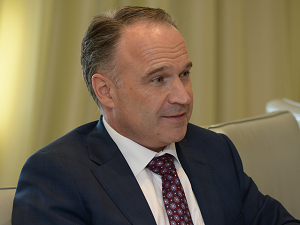Glenn Fortin, vice-president and U.S. equity specialist at Beutel, Goodman & Co., says that the U.S. market has been focused on growth and momentum stocks, and that this has made it most challenging for value investors. Essentially a bottom-up stock selector, Beutel Goodman uses strict value criteria in making its equity investments.
The broad U.S. equity market, says Fortin, as measured by the S&P 500 Index, has put on a lacklustre showing so far this year. This benchmark index produced a total return of 2% in U.S.-dollar terms from the beginning of the year to the end of May. The technology sector put up the strongest performance over that period, and the consumer discretionary sector also did well.
As modest as the S&P 500 Index's performance has been in the first five months of 2018, he notes, that it is still better than that of the Russell 1,000 Value Index, which had a negative total return of -1.9%. "This index is our benchmark for the performance of U.S. value stocks."
Fortin cautions that there are some headwinds facing the U.S. equity market. The S&P 500 Index is trading at a price/earnings multiple of roughly 21 times forward earnings per share estimates. "This means that the overall market is not cheap." In addition, he says, all equity markets have to address the impact on global economic growth of the trade wars initiated by the United States. "At the moment, this is just chatter and it has yet to bite, but it does create uncertainty." Also, U.S. monetary policy is now in tightening mode after the decades-long trend of falling and ultimately historically low interest rates. "The equity market has yet to fully digest this."
Fortin and his colleague Rui Cardoso co-manage portfolios of large-and mid-cap U.S. equities, including the U.S. equity portion of the firm's balanced funds. Included in their mandate is Beutel Goodman American Equity.
This fund, which holds 26 names, has significant sector weights in consumer discretionary stocks, information technology and health care. Consumer staples stocks are also a material weight. "We started 2017 with a zero weighting in the consumer discretionary sector and now it is the biggest sector weight in the portfolio."
In stock selection, Fortin and Cardoso target companies that have powerful franchises and operate in industries where there are high barriers to entry. Strong cash flow generation by the company is an important consideration. The team will establish a position in a stock where it considers that it can generate a 50% total return over a three-year-period.
 |
|
 |
|
| Glenn Fortin | |
 |
|
 |
|
 |
In the U.S. consumer discretionary sector, three names that Fortin is highlighting are: ![]() Omnicom Group (OMC),
Omnicom Group (OMC), ![]() AutoZone (AZO) and
AutoZone (AZO) and ![]() Harley-Davidson (HOG). "All three stocks are trading at a price/earnings discount relative to the equity market, as well as their own historic average multiples, and they have good upside," says Fortin. "They have not yet reached our target price."
Harley-Davidson (HOG). "All three stocks are trading at a price/earnings discount relative to the equity market, as well as their own historic average multiples, and they have good upside," says Fortin. "They have not yet reached our target price."
A global leader in brand management, Omnicom Group's business model was thought to be vulnerable, given that some of its major brand-name customers deal directly with companies like ![]() Facebook (FB) for their advertising, says Fortin. "But Omnicom has a great franchise in the branding business, as it offers a third-party strategic overview for its clients, and these tech firms do not have Omnicom's well-honed creative expertise."
Facebook (FB) for their advertising, says Fortin. "But Omnicom has a great franchise in the branding business, as it offers a third-party strategic overview for its clients, and these tech firms do not have Omnicom's well-honed creative expertise."
Also holding back the stock, he says, is the "temporary cutback in consumer package goods advertising, as some companies are restructuring or paring back overheads." Fortin and Cardoso do not expect this pullback in advertising expenditure to last. On its financials, Fortin says Omnicom is a strong free cash flow generator and produces high returns on invested capital, "which is a typical Beutel Goodman stock." The stock trades at around 13 times estimated forward earnings per share (versus 21 times for S&P 500 Index) and has a dividend yield of 3.2%.
AutoZone's stock came under pressure last year, says Fortin. The company is dominant in the field of aftermarket auto parts and accessories retailing in the United States, but investors were concerned about the impact on its business from on-line shopping through companies like ![]() Amazon.com (AMZN), he notes.
Amazon.com (AMZN), he notes.
It is important to recognize, he says, that AutoZone's customers "are mainly do-it-yourself weekend auto repair enthusiasts, who need the products straight away and are unlikely to resort to on-line shopping." On its financials, the company does not pay a dividend, but it has been "aggressively buying back its stock," says Fortin. "It has purchased almost 30% of its outstanding shares over the last five years." The stock trades at a forward price/earnings multiple of 12 times and "has not yet reached our target price."
Household-name motorcycle manufacturer Harley-Davidson, founded in 1903, has a 50% share of the U.S. market and significant growth opportunities outside of the United States, says Fortin. "We bought the stock in the second half of 2017," he says. "We like the company because of its strong franchise and, at the time, the stock was cheap and it remains so." The company, he says, has been going through a period of slower sales because the discretionary purchase of large-ticket items has yet to fully rebound after the recession.
Harley-Davidson trades at 12 times forward-earnings-per-share estimates. The stock has a dividend yield of 3.5%, and the company also has a robust share buyback program, says Fortin. "Over the last five years, it has reduced its share count by 25%."
| AutoZone Inc. | Harley-Davidson Inc. | Omnicom Group Inc. | |
 |
|||
| June 20 close | $686.97 | $45.57 | $75.56 |
 |
|||
| 52-week high/low | $797.89-$491.13 | $56.95-$39.34 | $83.95-$65.32 |
 |
|||
| Market cap | $18.0 billion | $7.4 billion | $17.0 billion |
 |
|||
| Total % return 1Y* | 15.7 | -15.2 | -6.5 |
 |
|||
| Total % return 3Y* | 0.13 | 5.5 | 4.1 |
 |
|||
| Total % return 5Y* | 10.1 | -0.9 | 6.1 |
 |
|||
 |
|||
| *As of June 20, 2018. All figures in U.S. dollars Source: Morningstar |
|||
In the consumer staples sector, a top-10 holding of Beutel Goodman American Equity is brand-name food company ![]() Kellogg (K). "This is a restructuring story, with the company taking costs out of its business and reinvesting in its brands," says Fortin. "It is not just a cereal producer; the company also has a strong franchise in the snack food business, with brands such as Pringles chips." Kellogg is a good free-cash-flow producer, he says, and has an ongoing share buyback program. "The bulk of its free cash flow is being returned to shareholders."
Kellogg (K). "This is a restructuring story, with the company taking costs out of its business and reinvesting in its brands," says Fortin. "It is not just a cereal producer; the company also has a strong franchise in the snack food business, with brands such as Pringles chips." Kellogg is a good free-cash-flow producer, he says, and has an ongoing share buyback program. "The bulk of its free cash flow is being returned to shareholders."
Among the largest holdings in the fund is telecommunications services company ![]() Verizon Communications (VZ). It has the best wireless network in the United States, says Fortin. "It continues to focus on its core business, and the environment for this business is improving with more rational pricing as the industry consolidates." The stock trades at 12 times forward earnings per share and has a dividend yield of 4.8%. "Verizon is a huge cash flow generator, and the stock has not yet reached our target."
Verizon Communications (VZ). It has the best wireless network in the United States, says Fortin. "It continues to focus on its core business, and the environment for this business is improving with more rational pricing as the industry consolidates." The stock trades at 12 times forward earnings per share and has a dividend yield of 4.8%. "Verizon is a huge cash flow generator, and the stock has not yet reached our target."
Beutel Goodman's sell discipline is to reduce its holding in a stock when its reaches the firm's target price and then reassess the holding. Based on valuation, Fortin and Cardoso have reduced the fund's holdings in global diversified healthcare company ![]() Baxter International (BAX) and in semiconductor testing company
Baxter International (BAX) and in semiconductor testing company ![]() Teradyne (TER).
Teradyne (TER).
Fortin and Cardoso have sold the portfolio's long-term holding in drug retailer and pharmacy benefit management company ![]() CVS Health (CVS). The sale took place, says Fortin, after CVS announced in early December last year that it was making a US$69-billion bid for the shares of health insurer
CVS Health (CVS). The sale took place, says Fortin, after CVS announced in early December last year that it was making a US$69-billion bid for the shares of health insurer ![]() Aetna (AET).
Aetna (AET).
"We considered that this proposed takeover was not in the best interest of CVS shareholders, as it was not the best use of the company's capital." Beutel Goodman, says Fortin, puts much emphasis on shareholder-friendly capital allocation by companies.


















